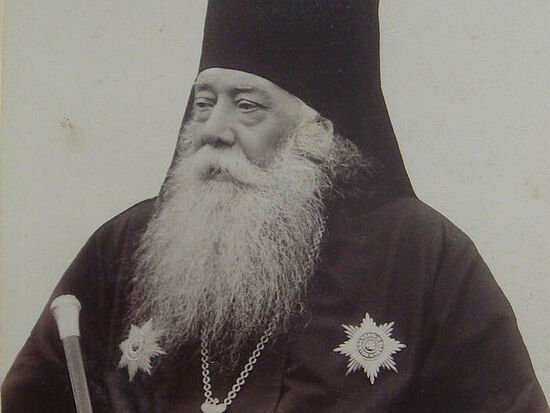 Let Us Fast in EarnestThus, let us begin on these fasting days to give ourselves to an intent study of fasting and prayer; and let us, at the same time, begin to fast and pray indeed.
Let Us Fast in EarnestThus, let us begin on these fasting days to give ourselves to an intent study of fasting and prayer; and let us, at the same time, begin to fast and pray indeed.
” class=”tooltip”>Part 1/1: Let us Fast in Earnest
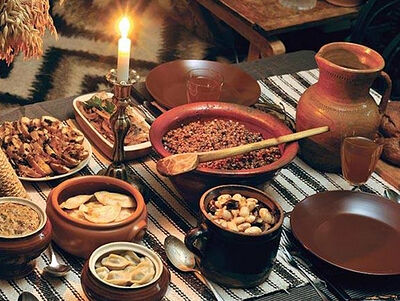 The Meaning and Significance of FastingFasting is a necessary means for success in the spiritual life and for attaining salvation; for fasting—depriving the flesh of excessive food and drink—weakens the force of sensual drives.” class=”tooltip”>Part 1/2: The Meaning and Significance of Fasting
The Meaning and Significance of FastingFasting is a necessary means for success in the spiritual life and for attaining salvation; for fasting—depriving the flesh of excessive food and drink—weakens the force of sensual drives.” class=”tooltip”>Part 1/2: The Meaning and Significance of Fasting
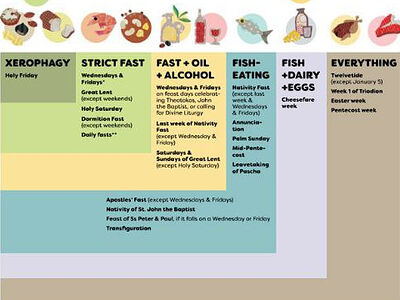 Accustoming Ourselves to FastingTo make our disposition towards fasting firm, we have to accustom ourselves to fasting slowly, carefully, not all at once, but gradually—little by little.” class=”tooltip”>Part 1/3: Accustoming Ourselves to Fasting
Accustoming Ourselves to FastingTo make our disposition towards fasting firm, we have to accustom ourselves to fasting slowly, carefully, not all at once, but gradually—little by little.” class=”tooltip”>Part 1/3: Accustoming Ourselves to Fasting
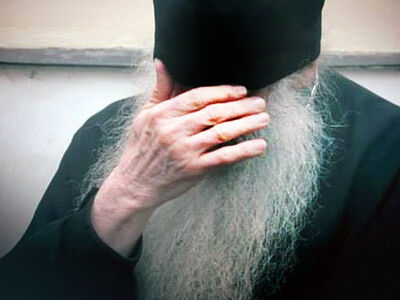 Spiritual FastingLet the mind fast, not permitting empty and bad thoughts; let the heart fast, refraining from sinful feelings; let our will fast, directing all our desires and intentions to the one thing needful…” class=”tooltip”>Part 1/4: Spiritual Fasting
Spiritual FastingLet the mind fast, not permitting empty and bad thoughts; let the heart fast, refraining from sinful feelings; let our will fast, directing all our desires and intentions to the one thing needful…” class=”tooltip”>Part 1/4: Spiritual Fasting
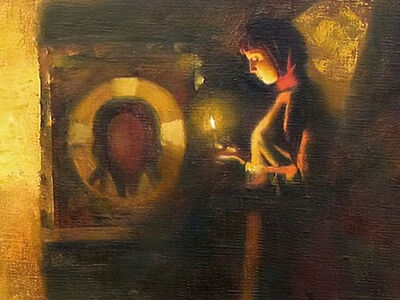 What is Prayer?A great prayerful power is at work in the prayers of the Holy Fathers, and whoever enters into them with all his attention and zeal will certainly taste of this prayerful power to the extent that his state of mind converges with the content of the prayer.” class=”tooltip”>Part 2/1: On Prayer. What is Prayer?
What is Prayer?A great prayerful power is at work in the prayers of the Holy Fathers, and whoever enters into them with all his attention and zeal will certainly taste of this prayerful power to the extent that his state of mind converges with the content of the prayer.” class=”tooltip”>Part 2/1: On Prayer. What is Prayer?
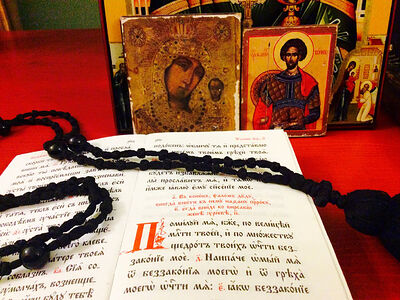 How to Prepare for Prayer?Thus, if you want to pray, gather all your thoughts, lay aside all external, earthly cares, and present your mind to God and gaze upon Him.” class=”tooltip”>Part 2/2: How to Prepare for Prayer?
How to Prepare for Prayer?Thus, if you want to pray, gather all your thoughts, lay aside all external, earthly cares, and present your mind to God and gaze upon Him.” class=”tooltip”>Part 2/2: How to Prepare for Prayer?
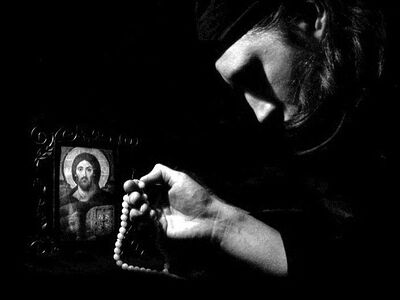 How to Pray?Absorb every word of prayer, bringing the meaning of every word into your heart; that is, understand what you read and feel what you have understood.” class=”tooltip”>Part 2/3: How to Pray?
How to Pray?Absorb every word of prayer, bringing the meaning of every word into your heart; that is, understand what you read and feel what you have understood.” class=”tooltip”>Part 2/3: How to Pray?
 What to Do After Prayer?Begin, for example, to reflect on the goodness of God, and you’ll see that you’re surrounded by the mercies of God both physically and spiritually, and you’ll fall before God in an outpouring of feelings of gratitude.” class=”tooltip”>Part 2/4: What to Do After Prayer?
What to Do After Prayer?Begin, for example, to reflect on the goodness of God, and you’ll see that you’re surrounded by the mercies of God both physically and spiritually, and you’ll fall before God in an outpouring of feelings of gratitude.” class=”tooltip”>Part 2/4: What to Do After Prayer?
 About the Jesus PrayerIn order not to get lost in the various methods and definitions of the Jesus Prayer, it’s enough to follow these teachers: St. John Climacus, St. Nilus of Sora, Fr. Seraphim of Sarov, and Dorotheos.” class=”tooltip”>Part 2/5: About the Jesus Prayer
About the Jesus PrayerIn order not to get lost in the various methods and definitions of the Jesus Prayer, it’s enough to follow these teachers: St. John Climacus, St. Nilus of Sora, Fr. Seraphim of Sarov, and Dorotheos.” class=”tooltip”>Part 2/5: About the Jesus Prayer
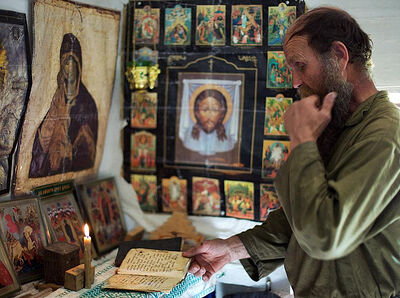 On Prayerful Ascent to God in the HeartThe penitential prayers of this beginning, “O God, cleanse me,” and the others remind the attentive reader of the times of the Old Testament, when fallen mankind sighed to Heaven, which was closed to him, for mercy.”>Part 2/6: On Prayerful Ascent to God in the Heart
On Prayerful Ascent to God in the HeartThe penitential prayers of this beginning, “O God, cleanse me,” and the others remind the attentive reader of the times of the Old Testament, when fallen mankind sighed to Heaven, which was closed to him, for mercy.”>Part 2/6: On Prayerful Ascent to God in the Heart
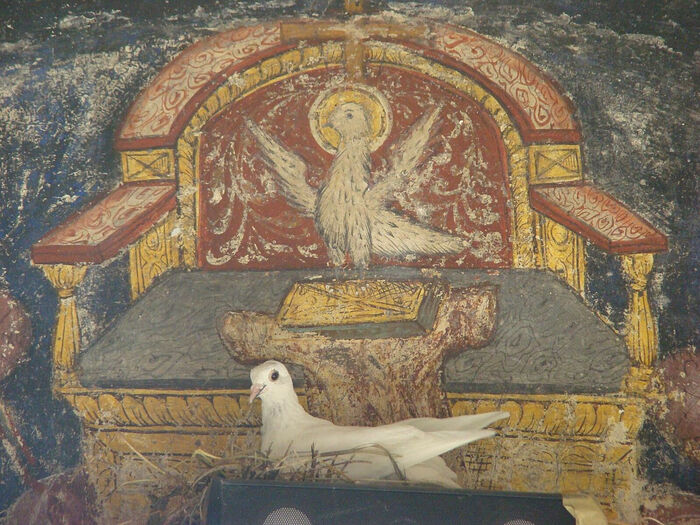 Photo: zondervanacademic.com
Photo: zondervanacademic.com
But know that by himself, left to his own devices, in the work of salvation without the 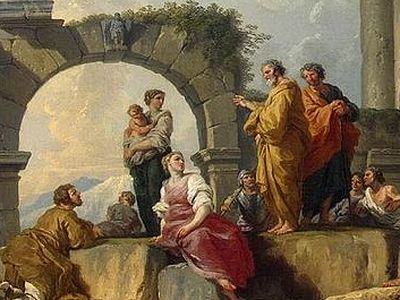 On GraceOh, how thankful we must be for all and everything—for the good and the evil; for the joy and the sorrow; and for the suffering and trials we must be grateful to God Who leads us along the path of salvation, not only by way of happiness, but above all and most of all by way of suffering.
On GraceOh, how thankful we must be for all and everything—for the good and the evil; for the joy and the sorrow; and for the suffering and trials we must be grateful to God Who leads us along the path of salvation, not only by way of happiness, but above all and most of all by way of suffering.
“>grace of God, a Christian can’t even think anything good; but all his satisfaction is from God. He especially doesn’t know how and for what he should pray; and only the Holy Spirit instructs him about what he should pray for, and intercedes for him with unutterable groanings (Rom. 8:26). Knowing all this, a Christian turns to the Holy Spirit with the prayer “O Heavenly King” and the rest.
Having invoked the Holy Spirit into his heart and soul, purified from every defilement of flesh and spirit by His grace, and placed by Him on the path of salvation, the Christian thus establishes the ascent to God in his heart, raises his heart and mind to Him; and having renounced all things earthly and ascended, as it were, to the first heaven, sends up the thrice-holy hymn to God, once heard by a boy who was enraptured from Earth to Heaven: “Holy God, Holy Mighty, Holy Immortal” (3x).
Having sung the angelic Trisagion hymn, the Christian, aware of himself not as a heavenly holy angel, but an earthly sinner, boldly goes further, higher, closer to God with his mind and heart, and ascends as it were to the second heaven, tremulously, with reverence, crying out: “Glory to the Father and the Son and the Holy Spirit;” and deeply aware of his sinfulness, his iniquity and his infirmities, he prays with a strong cry and tears, or, at least, he should pray: “O Most Holy Trinity, have mercy on us,” and the rest.
Not stopping there, with the prayer: “Lord, have mercy” (3x), a Christian aspires higher, with praise in his heart and on his lips; with “Glory, both now,” he mentally ascends as if to the third heaven, before the face of the Lord God Himself, eternally abiding in glory unspeakable, incessantly hymned by the archangels, angels, and all the saints of God; he ascends to this immeasurable height with a golden key from the very heart of God, so to speak, with the Lord’s Prayer, given to us by our Lord Jesus Christ; and with a living, sincere faith in the merits of the Cross of the Redeemer of mankind, having crossed himself, with filial boldness, he prays to the Heavenly Father: “Our Father, Who art in Heaven…”
Thus enraptured to the third heaven, like the holy  The Apostle Paul’s “Hymn of Love”There are sixteen properties of love, each worthy of separate analysis, described in this chapter. Let’s consider them from the point of view of psychology, as far as that is permissible in relation to the Holy Apostle Paul’s Epistle.
The Apostle Paul’s “Hymn of Love”There are sixteen properties of love, each worthy of separate analysis, described in this chapter. Let’s consider them from the point of view of psychology, as far as that is permissible in relation to the Holy Apostle Paul’s Epistle.
“>Apostle Paul, and realizing he was sprinkled with the blood of the Son of God, embraced by the favor of God the Father and quickened by the grace of the Holy Spirit, the Christian again cries out from the depths of his soul: “Lord, have mercy (12x). Glory to the Father and to the Son, and the Holy Spirit…” And knowing Who gave him such grace, he falls into the dust before his Savior, calling out to Him with all the strength and feelings of his spirit: “Come, let us worship” (3x).
Then, calmly, consciously, with deep feeling, he reads the prayers in order, beginning with Psalm 50 and the Creed, in fulfillment of the first Gospel commandment: Repent and believe in the Gospel (Mk. 1:14).
This is not only at the beginning of our prayers, but also in the middle, and more than once—nine times a day, and more than twenty times during Great Lent; and this is so that our attention, which sometimes weakens, might be constantly kept at a prayerful height.
Such is the meaning and significance of the entrance prayers and usual beginning! The first gathers our scattered thoughts and feelings and focuses them on the incarnate economy of our salvation, without which no prayer is conceivable; and the second establishes the ascent to God in our heart, which is absolutely necessary for proper and saving prayer.
O, my beloved, if only you would delve into the meaning of our prayers, understand their meaning and acquire the spirit of prayer! Then, inspired by  To Combine the Strictness of Fasting with Love for PeopleWe celebrate a prayer service to Greatmartyr Theodore the Tyro with gratitude to him and with the faith that true fasting is never put to shame, but the Lord covers the faster with His power, giving him spiritual joy and strength.
To Combine the Strictness of Fasting with Love for PeopleWe celebrate a prayer service to Greatmartyr Theodore the Tyro with gratitude to him and with the faith that true fasting is never put to shame, but the Lord covers the faster with His power, giving him spiritual joy and strength.
“>fasting and  Prayer, Temperance, and the Battle Against EvilIf you want to enter into the joy of the Lord and live eternally with Him, be zealous to emulate the Apostle Paul who says: But I discipline my body and bring it into subjection (1 Cor. 9:27).”>prayer, we would irresistibly strive for God; then we wouldn’t have this unfortunate lethargy, dullness, laziness, or unwillingness to pray. On the contrary, then we would be burning in spirit and would strive for prayer with unquenchable thirst. In a word, then the words of the Psalmist would be realized in us: As the hart panteth after the fountains of water, so panteth my soul after Thee, O God. My soul hath thirsted for God, the mighty, the living; when shall I come, and appear before the face of God? (Ps. 41:1-2).
Prayer, Temperance, and the Battle Against EvilIf you want to enter into the joy of the Lord and live eternally with Him, be zealous to emulate the Apostle Paul who says: But I discipline my body and bring it into subjection (1 Cor. 9:27).”>prayer, we would irresistibly strive for God; then we wouldn’t have this unfortunate lethargy, dullness, laziness, or unwillingness to pray. On the contrary, then we would be burning in spirit and would strive for prayer with unquenchable thirst. In a word, then the words of the Psalmist would be realized in us: As the hart panteth after the fountains of water, so panteth my soul after Thee, O God. My soul hath thirsted for God, the mighty, the living; when shall I come, and appear before the face of God? (Ps. 41:1-2).
 Photo: Facebook
Photo: Facebook  Director of Orthodox Africa Escapes MobA mission without a mission car is paralyzed.
Director of Orthodox Africa Escapes MobA mission without a mission car is paralyzed. New mission center in Kampala will help Ugandan Church communities become self-sufficientSt. John the Wonderworker Orthodox Christian Mission Center was officially established on Palm Sunday 2022 with the blessing of the late Metropolitan Hilarion (Kapral) of the Russian Orthodox Church Outside of Russia. The main goal of this mission is to create an economically independent and self-sufficient group of local leaders.
New mission center in Kampala will help Ugandan Church communities become self-sufficientSt. John the Wonderworker Orthodox Christian Mission Center was officially established on Palm Sunday 2022 with the blessing of the late Metropolitan Hilarion (Kapral) of the Russian Orthodox Church Outside of Russia. The main goal of this mission is to create an economically independent and self-sufficient group of local leaders.Fr. Silouan (Brown)Silouan (Brown), Monk



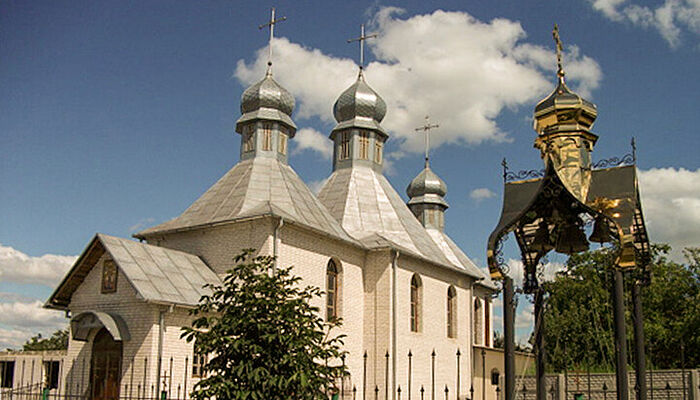
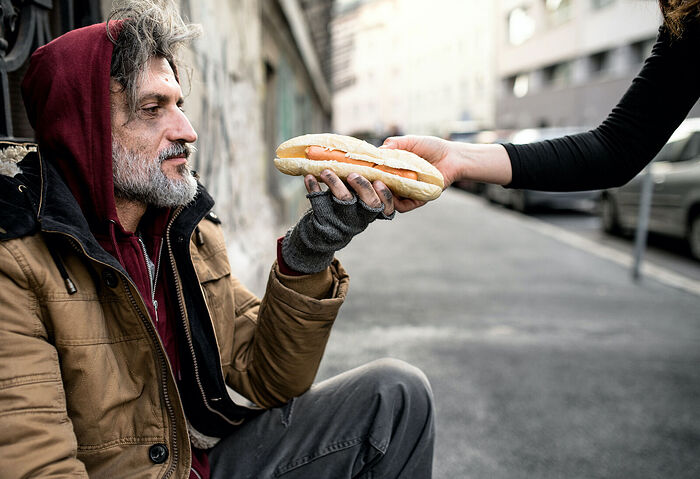
 On True Fasting and Love of NeighborWithout love, a Christian is not a Christian. And Christianity is not Christianity.
On True Fasting and Love of NeighborWithout love, a Christian is not a Christian. And Christianity is not Christianity. Cultivating Love for God and His ChurchLet us cultivate within ourselves every kind of love and heartfelt attraction to God, to Christ, to His holy Church. Let us give ourselves no rest until Christ, His Church, and the saints are dear to us not only in times of trouble, but also when we have no troubles, when we have nothing to implore, and there remains only to rejoice in the Lord and praise Him.”>love for God. What can be more sublime than this?
Cultivating Love for God and His ChurchLet us cultivate within ourselves every kind of love and heartfelt attraction to God, to Christ, to His holy Church. Let us give ourselves no rest until Christ, His Church, and the saints are dear to us not only in times of trouble, but also when we have no troubles, when we have nothing to implore, and there remains only to rejoice in the Lord and praise Him.”>love for God. What can be more sublime than this?  Be MercifulChrist promises a great reward for the fulfillment of His words: Ye shall be the children of the Highest. What could be higher than that? Christ is the Son of God, and we will be sons of God.
Be MercifulChrist promises a great reward for the fulfillment of His words: Ye shall be the children of the Highest. What could be higher than that? Christ is the Son of God, and we will be sons of God. Let Us Fast in EarnestThus, let us begin on these fasting days to give ourselves to an intent study of fasting and prayer; and let us, at the same time, begin to fast and pray indeed.
Let Us Fast in EarnestThus, let us begin on these fasting days to give ourselves to an intent study of fasting and prayer; and let us, at the same time, begin to fast and pray indeed. The Meaning and Significance of FastingFasting is a necessary means for success in the spiritual life and for attaining salvation; for fasting—depriving the flesh of excessive food and drink—weakens the force of sensual drives.” class=”tooltip”>Part 1/2: The Meaning and Significance of Fasting
The Meaning and Significance of FastingFasting is a necessary means for success in the spiritual life and for attaining salvation; for fasting—depriving the flesh of excessive food and drink—weakens the force of sensual drives.” class=”tooltip”>Part 1/2: The Meaning and Significance of Fasting Accustoming Ourselves to FastingTo make our disposition towards fasting firm, we have to accustom ourselves to fasting slowly, carefully, not all at once, but gradually—little by little.” class=”tooltip”>Part 1/3: Accustoming Ourselves to Fasting
Accustoming Ourselves to FastingTo make our disposition towards fasting firm, we have to accustom ourselves to fasting slowly, carefully, not all at once, but gradually—little by little.” class=”tooltip”>Part 1/3: Accustoming Ourselves to Fasting Spiritual FastingLet the mind fast, not permitting empty and bad thoughts; let the heart fast, refraining from sinful feelings; let our will fast, directing all our desires and intentions to the one thing needful…” class=”tooltip”>Part 1/4: Spiritual Fasting
Spiritual FastingLet the mind fast, not permitting empty and bad thoughts; let the heart fast, refraining from sinful feelings; let our will fast, directing all our desires and intentions to the one thing needful…” class=”tooltip”>Part 1/4: Spiritual Fasting What is Prayer?A great prayerful power is at work in the prayers of the Holy Fathers, and whoever enters into them with all his attention and zeal will certainly taste of this prayerful power to the extent that his state of mind converges with the content of the prayer.” class=”tooltip”>Part 2/1: On Prayer. What is Prayer?
What is Prayer?A great prayerful power is at work in the prayers of the Holy Fathers, and whoever enters into them with all his attention and zeal will certainly taste of this prayerful power to the extent that his state of mind converges with the content of the prayer.” class=”tooltip”>Part 2/1: On Prayer. What is Prayer? How to Prepare for Prayer?Thus, if you want to pray, gather all your thoughts, lay aside all external, earthly cares, and present your mind to God and gaze upon Him.” class=”tooltip”>Part 2/2: How to Prepare for Prayer?
How to Prepare for Prayer?Thus, if you want to pray, gather all your thoughts, lay aside all external, earthly cares, and present your mind to God and gaze upon Him.” class=”tooltip”>Part 2/2: How to Prepare for Prayer? How to Pray?Absorb every word of prayer, bringing the meaning of every word into your heart; that is, understand what you read and feel what you have understood.” class=”tooltip”>Part 2/3: How to Pray?
How to Pray?Absorb every word of prayer, bringing the meaning of every word into your heart; that is, understand what you read and feel what you have understood.” class=”tooltip”>Part 2/3: How to Pray? What to Do After Prayer?Begin, for example, to reflect on the goodness of God, and you’ll see that you’re surrounded by the mercies of God both physically and spiritually, and you’ll fall before God in an outpouring of feelings of gratitude.” class=”tooltip”>Part 2/4: What to Do After Prayer?
What to Do After Prayer?Begin, for example, to reflect on the goodness of God, and you’ll see that you’re surrounded by the mercies of God both physically and spiritually, and you’ll fall before God in an outpouring of feelings of gratitude.” class=”tooltip”>Part 2/4: What to Do After Prayer? About the Jesus PrayerIn order not to get lost in the various methods and definitions of the Jesus Prayer, it’s enough to follow these teachers: St. John Climacus, St. Nilus of Sora, Fr. Seraphim of Sarov, and Dorotheos.” class=”tooltip”>Part 2/5: About the Jesus Prayer
About the Jesus PrayerIn order not to get lost in the various methods and definitions of the Jesus Prayer, it’s enough to follow these teachers: St. John Climacus, St. Nilus of Sora, Fr. Seraphim of Sarov, and Dorotheos.” class=”tooltip”>Part 2/5: About the Jesus Prayer On Prayerful Ascent to God in the HeartThe penitential prayers of this beginning, “O God, cleanse me,” and the others remind the attentive reader of the times of the Old Testament, when fallen mankind sighed to Heaven, which was closed to him, for mercy.”>Part 2/6: On Prayerful Ascent to God in the Heart
On Prayerful Ascent to God in the HeartThe penitential prayers of this beginning, “O God, cleanse me,” and the others remind the attentive reader of the times of the Old Testament, when fallen mankind sighed to Heaven, which was closed to him, for mercy.”>Part 2/6: On Prayerful Ascent to God in the Heart 
 On GraceOh, how thankful we must be for all and everything—for the good and the evil; for the joy and the sorrow; and for the suffering and trials we must be grateful to God Who leads us along the path of salvation, not only by way of happiness, but above all and most of all by way of suffering.
On GraceOh, how thankful we must be for all and everything—for the good and the evil; for the joy and the sorrow; and for the suffering and trials we must be grateful to God Who leads us along the path of salvation, not only by way of happiness, but above all and most of all by way of suffering. The Apostle Paul’s “Hymn of Love”There are sixteen properties of love, each worthy of separate analysis, described in this chapter. Let’s consider them from the point of view of psychology, as far as that is permissible in relation to the Holy Apostle Paul’s Epistle.
The Apostle Paul’s “Hymn of Love”There are sixteen properties of love, each worthy of separate analysis, described in this chapter. Let’s consider them from the point of view of psychology, as far as that is permissible in relation to the Holy Apostle Paul’s Epistle. To Combine the Strictness of Fasting with Love for PeopleWe celebrate a prayer service to Greatmartyr Theodore the Tyro with gratitude to him and with the faith that true fasting is never put to shame, but the Lord covers the faster with His power, giving him spiritual joy and strength.
To Combine the Strictness of Fasting with Love for PeopleWe celebrate a prayer service to Greatmartyr Theodore the Tyro with gratitude to him and with the faith that true fasting is never put to shame, but the Lord covers the faster with His power, giving him spiritual joy and strength. Prayer, Temperance, and the Battle Against EvilIf you want to enter into the joy of the Lord and live eternally with Him, be zealous to emulate the Apostle Paul who says: But I discipline my body and bring it into subjection (1 Cor. 9:27).”>prayer, we would irresistibly strive for God; then we wouldn’t have this unfortunate lethargy, dullness, laziness, or unwillingness to pray. On the contrary, then we would be burning in spirit and would strive for prayer with unquenchable thirst. In a word, then the words of the Psalmist would be realized in us: As the hart panteth after the fountains of water, so panteth my soul after Thee, O God. My soul hath thirsted for God, the mighty, the living; when shall I come, and appear before the face of God? (Ps. 41:1-2).
Prayer, Temperance, and the Battle Against EvilIf you want to enter into the joy of the Lord and live eternally with Him, be zealous to emulate the Apostle Paul who says: But I discipline my body and bring it into subjection (1 Cor. 9:27).”>prayer, we would irresistibly strive for God; then we wouldn’t have this unfortunate lethargy, dullness, laziness, or unwillingness to pray. On the contrary, then we would be burning in spirit and would strive for prayer with unquenchable thirst. In a word, then the words of the Psalmist would be realized in us: As the hart panteth after the fountains of water, so panteth my soul after Thee, O God. My soul hath thirsted for God, the mighty, the living; when shall I come, and appear before the face of God? (Ps. 41:1-2). 